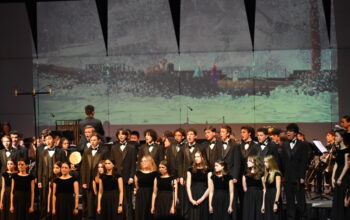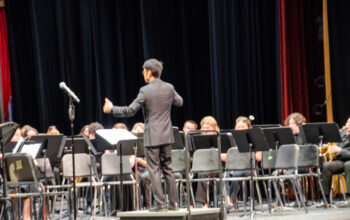
Audrey Piehl
Arts & Entertainment Editor
When most students think of “band camp,” usually one of two scenarios emerge. The first being a clumsy but content marching band, clad in unflattering ruffles. The second, a certain scene from a certain nineties cult classic. However, it just so happens the Boston University Tanglewood Institute (BUTI), junior Harrison Miller’s summer program of choice, does not meet any of these criteria. In fact, BUTI is the most prestigious summer orchestra program in the world. Under the guidance of the elite Boston Symphony Orchestra and other professionals, BUTI is an artistic haven, driven by the passion and skill of those who attend. From a 7:30 a.m. wake up everyday to many music-filled late nights, it’s really quite the experience.
But learning of this program from someone who can barely play Guitar Hero seems hardly fair. Let bassoonist Harrison Miller tell you first hand what life was like up in Lenox, Massachusetts, home of BUTI and one of the most incredible summers of his life. You’ll never think of “band camp” the same way again.
Entry Number 1: June 29th, 2011
“I am in the middle of my second week here at BUTI and the Workshop programs are in full-swing…The workshop programs offered here are designed to give us instrumentalists an intensive learning experience with some of the most esteemed professionals in the business. Most of the teachers here are also members of the Boston Symphony Orchestra.
During the first week Richard Svoboda, Principal Bassoonist of the Boston Symphony Orchestra, ran the seminar. Every other day we had master classes where we would perform various solo repertoire for the entire bassoon studio in the program. We performed a single piece which we prepared, and Mr. Svoboda gave us advice on how to play it, which included short anecdotes about the composters, and demonstrations of how to play certain passages in order to improve common technical errors. After he finished, he had us play the piece again, in light of his comments. The master classes focused on the finer details of attack, tone, phrasing, and overall shape. Mr. Svoboda expected that we have complete control of more basic elements such as rhythm and pitchDuring my time in the master classes, Mr. Svoboda focused a great deal of the time working on my articulation; he wanted it to be lighter and more ‘pronounced’.
In addition to master classes, we had “Orchestral Excerpt Class” in the afternoon where we would take common and often difficult portions of different bassoon parts from orchestral music and study them. The benefit of having an active musician like Mr. Svoboda teach this class is that he has performed all the pieces we worked on with the Boston Symphony Orchestra, one of the world’s greatest orchestras. Now I am in the second week, working with Suzanne Nelsen, who is the Second Bassoonist of the Boston Symphony Orchestra, and I am having a great time.”
Entry Number 2: July 13th, 2011
“Now that the orchestra program has begun I figure I should write a bit. Every two weeks we have a concert and this concert cycle I have a lot of free time because I am playing contrabassoon, and although I really hate playing contra, I have to stay positive because I know that my time here can only get better. The contrabassoon is what we call an auxiliary instrument; an extra. People rarely play the contrabassoon exclusively just because there is little repertoire written for it. It was created because composers wanted to extend the range of the orchestra lower, so the contrabassoon is the lowest instrument in the orchestra…You cannot really hear it, so it doesn’t really matter. BUTI uses the rotation system, so I will not be playing it more than once.
When the orchestral program began, we had to audition for the Woodwind and Brass coaches in order to determine the seating (what parts we would get to play) and the chamber music groups. People really want to play well at the audition because it determines your fate throughout the festival. Everybody loves playing the Principal parts because of the solos, but everybody gets to play principal so even though I am not playing the best part this concert I know my parts will improve. The audition consists of a solo piece and a selection of orchestral excerpts you get before the audition. This concert we are playing Tchaikovsky’s Sixth Symphony, and Revueltas’ Sensemaya which will be conducted by Paul Haas. I only play on Sensemaya, and I only play contrabassoon; I pretty much have the worst part in the orchestra, playing about forty-five seconds out of a six minute piece on an hour-long program. But, everything happens for a reason. And although it really blows that I am not really playing the ‘big piece’ this rotation, I know that there will be another huge part I get to play, and having this free time (because I am only at rehearsals for fifteen minutes out of the three hours) means I can practice and make reeds, and catch up on some sleep.”
Entry Number 3: July 29th,2011
“This concert rotation we are working with Mei-Ann Chen, who is one of the most wonderful conductors that I have ever worked with. Mei-Ann conducts in the Chicago-area and she is a very exciting conductor because she radiates energy and inspires us to become the best musicians we can. This concert series I am playing on both pieces; Rachmaninoff’s Symphonic Dances and Franck’s Symphony in D minor. I am playing second bassoon on both pieces, and although I do not have any huge solos, I feel better knowing that my parts are going to continue to improve for the last concert. Rehearsals are starting to feel long; we start at 9:00 AM and continue until 12:00 PM every day except Sunday but because Mei-Ann is such an amazing conductor I really don’t mind. Also, I am playing chamber music in a woodwind quintet. Chamber music is a form of classical music, written for a small group of instruments which traditionally could be accommodated in a palace chamber.
When we are not in rehearsals, which is rare because, we have time to go see the Boston Symphony Orchestra (BSO). The BSO performs every Thursday, Friday, and Saturday night, with a matinee on Sundays. So far, I have been able to see some amazing soloists play with the orchestra like Yo-Yo Ma, Joshua Bell, and Sarah Chang. In order to see the concerts we take a five minute bus ride to the Koussevitzky Music Shed located on Tanglewood’s Main Grounds. We can choose to sit inside the shed or outside on the lawn. It is always great to hear the bassoonists that taught me for two weeks perform in a professional setting. My only concern right now is that I feel like I don’t have enough time to myself for personal practice. At home, I usually set aside three hours for practicing, but here there just isn’t enough time in the day between rehearsals. Sometimes I can sneak in one hour, but that really does not suffice. But, I am comfortable knowing that my time for personal practice is spent in rehearsals, so it is not like I am just slacking off.”
Entry Number 4: August 10th, 2011
“This concert I am finally playing my principal part. I was assigned principal bassoon of Elgar’s Enigma Variations. What I am finding very difficult about the Elgar is that it is extremely exposed playing. The orchestra is used very sparingly, and It is Elgar’s best-known large-scale composition, for both the music itself and the enigmas behind it. Elgar dedicated the piece to “my friends pictured within”, each variation being an affectionate portrayal of one of his circle of close acquaintances. Every movement (there are fourteen of them) is dedicated to one of Elgar’s closest friends.
Although I am extremely happy to be leading my section, I am finding it hard to work with the conductor this concert rotation. David Hoose is a musical genius and I have a little bit of trouble understanding what he wants from the orchestra. The coaches have told us to be receptive to his comments and never to take things he says personally, which I value a lot. Something I have been able to learn through this whole experience is how to deal with very different conductors; as a musician I have learned that you are not always going to have the pleasure of working with a wonderful person who happens to be an excellent conductor. Some of the best conductors are hated by some of the best orchestras simply because they’re not kind people even though they are great musicians. Even though I didn’t get the best parts to play in orchestra, or have tons of time to practice, I can genuinely say that my time at Tanglewood has improved my ethics as a musician, and although I cannot wait to get home (eight weeks was too much) I will miss my summer here at Tanglewood.”



